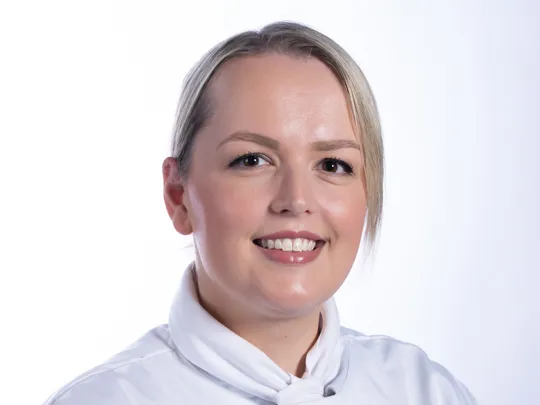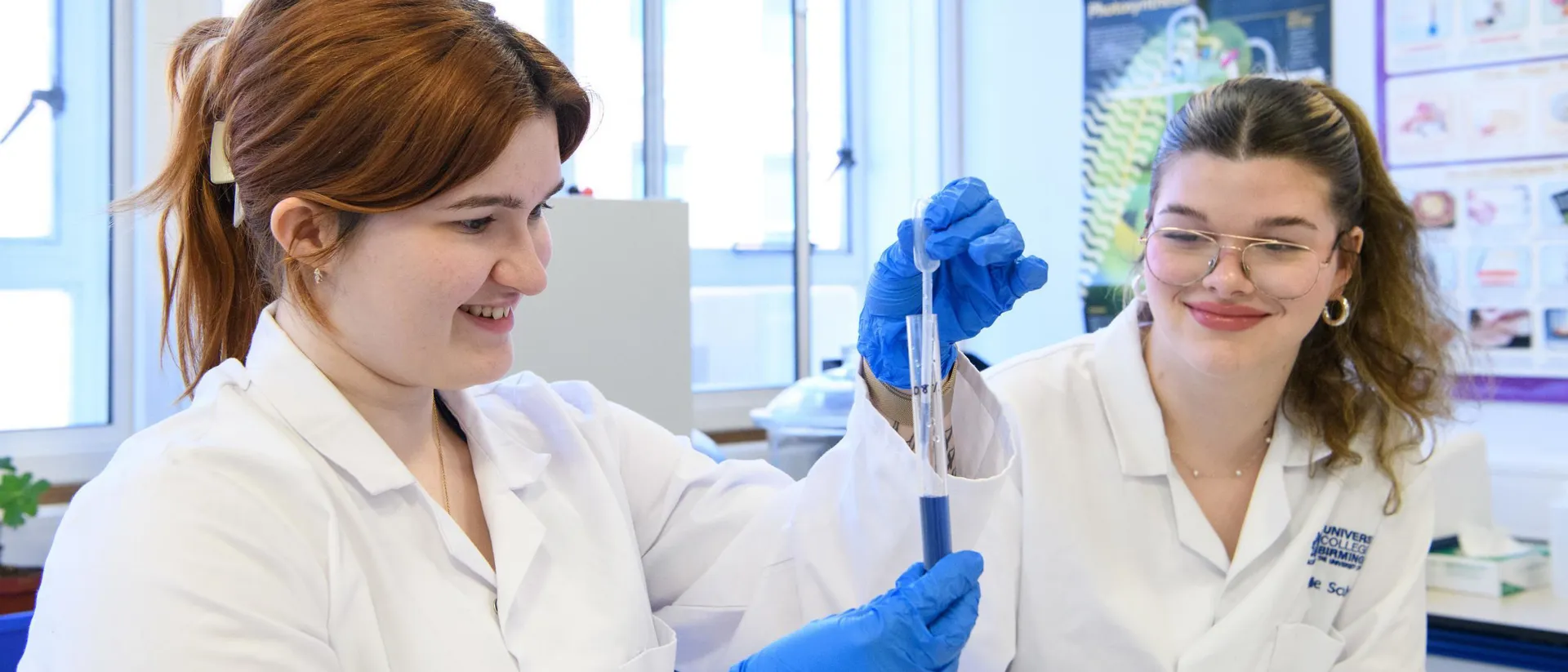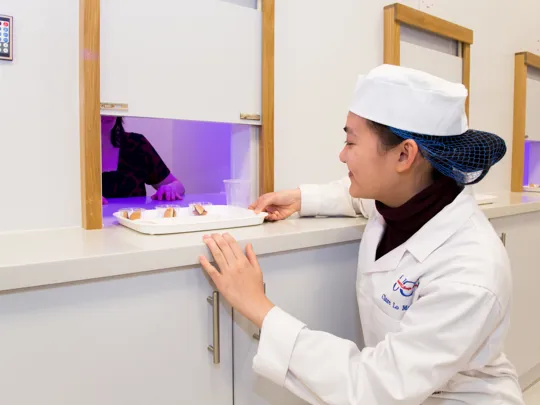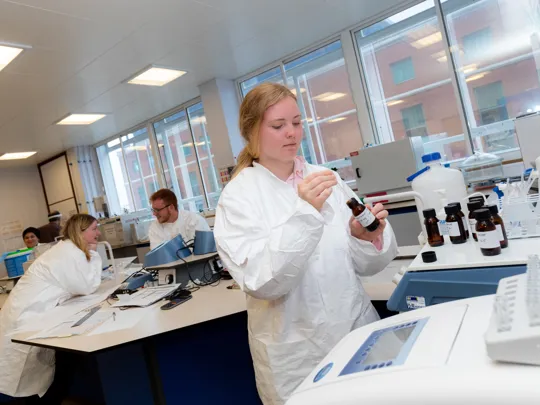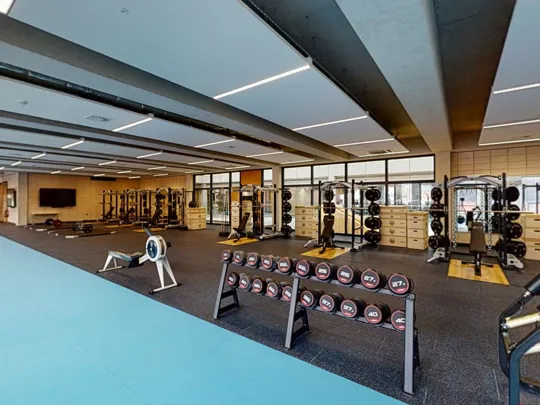of graduate employers say relevant experience is essential to getting a job with them
Why choose this degree course?
- WORK PLACEMENTS – Boost your employability and real-world experience through undertaking work placements in the industry in line with your interests
- INDUSTRY VISITS – Visit industry sites and events with essential costs covered by the University – past visits have included food exhibitions, manufacturers, farms and producers
- SPECIALISE YOUR STUDIES – Develop a specialism relevant to your chosen career through optional modules covering subjects such as Sports and Exercise Nutrition and Food Product Design Development
- PRACTICAL APPLICATION – Put your knowledge into practice working in our cutting-edge Food Science and Innovation Suite and other facilities
- ENRICHMENT – Our links with the food industry offer an array of opportunities including guest lectures and industry research
- AWARD-WINNING UNIVERSITY – Study at the highest-ranking university in the region according to student choice (Whatuni Student Choice Awards 2024)
Our facilities
University College Birmingham is renowned for its outstanding food industry training facilities. Studying our Food and Nutrition degree course means you will have access to our state-of-the-art food development facilities including our Food Science and Innovation Suite, as well as our Human Performance Centre.
Course breakdown
Students on the FdSc have the option of progressing onto the final year upon completion of the foundation degree.
- Year 1
- Year 2
- Year 3
Core modules
Culinary Skills for Nutrition
As a nutritionist or dietician, you will need to be able to advise others on what foods to focus on and how to obtain vital nutrients through the cooking of healthy, nutritious and enjoyable dishes. By producing a range of these types of dishes, you will learn the required skills and competencies to excel in your vocation.
Food Manufacture
You will be provided with a fundamental understanding of the principles of food manufacture including HACCP, food safety, sensory analysis and key manufacturing trends.
Food Science
By examining the scientific properties of food products you will learn about core chemical, microbiological and physical components and understand their function within the food. You will assess the quality of these products in relation to the performance of these components during processing.
Introduction to Human Anatomy and Physiology
You will be introduced to the area of human anatomy and physiology and how the body maintains these bodily systems in a state of homeostasis. Physiological systems studied will include: digestive, musculoskeletal, renal and excretory; cardiovascular, respiratory and brain and neurological. Effects of loss of homeostasis will also be discussed.
Introduction to Nutrition
You will be introduced to nutrition as an integrated subject. This will include consideration of the individual components which make up the human diet, including macronutrients, micronutrients and the non-nutritional elements of food and study their specific roles within the human diet. In addition you will consider Government dietary recommendations, dietary patterns and the foundations of ill health linked to diet.
Public Health and Nutrition
Public health and diet considers the general population and their diets in terms of health promotion. Specific government initiatives and their effectiveness will be considered and you will investigate different ways of assessing an individual's energy requirements and expenditure by covering anthropometric measurements.
Core modules
Nutrition through the Lifecycle
Focusing on the specific area of childhood nutrition, you will be studying the requirements and legislation surrounding pre-natal, infant, toddler, child and teenage nutrition. You will also pay attention to both policy and practice and how the ultimately impact young individuals.
Personal and Professional Development
In this module you will research the career opportunities available within your chosen industry, exploring the pathways that will enable you to identify and develop the personal and management skills required to be successful. You will be expected to complete a 40-hour placement within one or more organisations to enable you to explore future career pathways. Following this you will review your experiences and development, forming an action plan for your future career.
Psychology of Eating Behaviour
In order to be well equipped to work as a nutrition professional it's essential to have compassionate care and cultural competence, understanding the most up to date evidence-based methods and techniques to work with the public. This module seeks to further develop understanding of the complexity of food choice and the physiological, political, psychological, social and cultural factors which affect it. In addition, it will introduce students to intervention strategies such as motivational interviewing and digital technology and telehealth as care pathways.
Research for Food and Nutrition
You will develop your ability to carry out effective research, considering research within the health field, specific nutrition methodologies, data capture and statistics. You will also consider any current limitations of existing research.
The Science of Nutrition
The science of nutrition module aims to further develop understanding of the science behind nutrients, including their metabolism, and the impact of non-nutrients and anti-nutrients.
Choose 1 optional module
Food Product Design Development
Food technologists and product developers need to understand the ingredients that can be incorporated into food products and how they relate to the formulation of new and innovative developments as well as improving existing products. This module has a strong industry focus, allowing the opportunity to develop a product in line with current consumer trends. You will also study the theories of product development strategies for new products and product improvement and considerations around scale-up. You will also have the opportunity to reflect on the development process, a key skill required in industry.
Sport and Exercise Nutrition
You will examine the nutritional needs of athletes and those undertaking substantial exercise programmes, exploring the importance of nutrition in achieving health and performance. Other topics addressed will include exercise and metabolism, energy generation, hydration and vitamin and mineral needs for athletic performance.
Core modules
Contemporary Issues in Food and Nutrition
Students will study contemporary issues and trends in food and nutrition by reading press articles and scientific reports. In addition, students will study buyer behaviour to see if it affects the popularity of certain market products.
Disease Modulation through Dietary Changes
This module covers how a well-balanced diet can support overall health specifically through the prevention and treatment of disease. We will cover how diet can be used to help contribute towards the prevention of certain diseases, as well as aid in the treatment of symptoms of others. This module further seeks to provide understanding of health claims in the health and well-being market and the role of nutritionists in examining these claims through scientific method and educating the public in their veracity and efficacy. The module does not seek to treat, mitigate or cure any diseases, what will be learned on this module is not a substitute for professional medical advice. What the module will do is develop consideration of the positive contribution nutritional balance and modifications can make to disease prevention and treatment.
Food Security, Supply and Sustainability
Students will learn more about the various elements and sectors that influence food security, supply and sustainability. This will broaden their knowledge of the food industry and wider factors such as politics, agriculture, ethics and biodiversity to name a few.
Food and Nutrition Project
You will conceptualise and carry out a nutrition research project. This will involve; identifying an appropriate methodology for your research question; conducting the project; analysing the results; and presenting your findings as a dissertation and oral presentation.
Choose 1 optional module
Nutrition Communication
Today's nutrition professionals need advanced communication knowledge and skills to excel in their career, whether they are working in public health settings, with individual clients or providing food businesses with advice. This module seeks to enhance interpersonal, non-verbal, oral and written communication skills whilst providing students with an understanding of the importance of evidence based practices, and being able to translate nutrition messages to a wide variety of audiences. Students will be given the opportunity to apply their nutrition knowledge to real world settings and across multiple platforms.
Nutrition for Performance
You will explore advanced concepts in sports nutrition and look at the application of diet in response to individualised sport specific needs through the assessment of anthropometry and caloric assessment. You will analyse the use of contemporary and emerging diets within sport such as the Palaeolithic diet, ketogenic diets and intermittent fasting practices.
Principles of Food Technology
Students will study the principles of food technology in context with the food industry. Students will also have the opportunity to develop a product using key preservation principles, alongside gaining industry relevant food safety qualifications.
The modules listed above for this course are regularly reviewed to ensure they are up to date and informed by industry as well as the latest teaching methods. On occasion, we may need to make unexpected changes to modules – if this occurs, we will contact all offer holders as soon as possible.
Entry requirements
Food and Nutrition BSc (Hons)
A-levels: An A-level grade profile of CDD.
T-levels: A T-level graded Pass with a core component of grade C.
BTEC: A BTEC grade profile of MMP. This can be achieved from either an Extended Diploma or a combination of smaller BTEC qualifications.
Tariff: Other Level 3 qualifications are accepted for entry. A minimum of 80 UCAS Tariff points will be required.
Access to Higher Education Diploma: 80 UCAS Tariff points, including a minimum of 15 Level 3 credits at Distinction.
GCSE/IGCSE: Science grades A*-C (grade 9-4) or equivalent.
The following Level 2 Science qualifications are acceptable:
- GCSE Single Award in Chemistry, Biology or Physics
- GCSE Science Double Award
- BTEC Level 2 in Science with a Pass profile
Food and Nutrition FdSc
A-levels: An A-level grade profile of DD.
T-levels: A T-level graded Pass with a core component profile less than C.
BTEC: A BTEC grade profile of PP. This can be achieved from either an Extended Diploma or a combination of smaller BTEC qualifications.
Tariff: Other Level 3 qualifications are accepted for entry. A minimum of 32 UCAS Tariff points will be required.
Access to Higher Education Diploma: 32 UCAS Tariff points.
GCSE/IGCSE: Science grades A*-C (grade 9-4) or equivalent.
The following Level 2 Science qualifications are acceptable:
- GCSE Single Award in Chemistry, Biology or Physics
- GCSE Science Double Award
- BTEC Level 2 in Science with a Pass profile
Non-tariff: Non-UCAS Tariff-based Level 3 qualifications are also considered for entry. Please complete our enquiry form here to check your eligibility.
Work-based: We also give equal consideration to applicants who are currently in work and wish to apply to University College Birmingham. To apply, you must have a minimum of 3 years’ relevant work experience, demonstrating management or supervisory duties. Your application must also include a reference from your line manager supporting your entry to higher education. For further details, please contact Admissions.
International students
For academic and English entry requirements for EU and international students, please visit the Country Specific Information page.
Please note: As an International Student, when choosing optional placement, a visa extension may be required.
English requirement
International students applying for the course should meet the following:
- IELTS of 6.5 with a minimum of 6.0 in each component - or UCB English Test with B2+ overall with no less than B2 in each component
Key information
Teaching and assessment
Note: Indicative information only – actual timetables and assessment regimes will be issued at your induction.
Teaching
Example of a typical teaching week (up to 15 contact hours):
- Large group teaching – 9 hours
- Practical kitchen session – up to 3 hours in first year
- Tutorials – 1 hour
- Subject advice sessions – 1 hour
- Practical lab sessions - 2 hours
You will also need to commit around 20 hours per week for individual study time.
Assessment
Estimated breakdown of assessment for this degree course (weighting will vary depending on optional modules):
- Coursework – 80%
- Practical assessment – 10%
- Written examinations – 10%
Our teaching and assessment is underpinned by our Teaching, Learning and Assessment Strategy 2021-2024.
Timetable
We understand that you need to balance study with work, so wherever possible your lessons will be timetabled into 2-3 days a week.
Tuition fees for home students
If you are a home student enrolling on a bachelor's or foundation degree course at University College Birmingham, the 2025/2026 academic year tuition fee for full-time study is £9,535. For part-time study, the fee is £4,767.50.
Tuition fees for international students
If you are an international student (or have been fee assessed as an international fee payer) and are enrolling on a full-time [Band 1] bachelor's degree course in 2025/2026, the fee for the academic year will be £16,000. If you complete a placement year, there will be an administration fee of £500 for a full year or £250 for a half-year placement.
Uniform and kit costs
This course requires a uniform and kit costing approximately £250-300, depending on the items you purchase. (Prices are subject to change each year – exact costs and information on how to order required items will be provided to you prior to enrolment.)
Kick-Start Scheme
As a new student studying this course full-time, you will receive £300 per year through our Kick-Start Scheme (UK students only, eligibility criteria applies). This scheme will support your studies and future career by contributing to course-related materials, uniform or selected items on campus. You may also qualify for an additional £500 per year.
Find out more about the Kick-Start Scheme here.
Unibuddy Community - meet other students on your course
Starting university is an exciting time, but we understand that it can sometimes feel a little daunting. To support you, you will be invited to join our Unibuddy Community, where you can meet other students who have applied for the same course at University College Birmingham, before you start studying here.
As soon as you have been made an offer, you will be sent an invitation email to complete your registration and join the Unibuddy Community. For more information, check out our Unibuddy Community page.
Latest updates
Join the conversation and check out the latest updates from the Department of Health and Nutrition.

Have questions around your chosen subject or course content? Are you wondering what you can expect to study as part of your course? Fill out our form and chat to a lecturer.
Work placements
Work placements are vital for gaining real-life experience and for building your confidence and skills before you finish your course – and they may even lead to a job when you graduate. Our HIRED team can help find the ideal placement for you.
You are encouraged to gain work experience throughout this course in order to put your learning into practice alongside qualified professionals, with a wide range of opportunities available through our close working relationships with the food science and product development industries.
You will also complete the Personal and Professional Development module, in which you will undertake at least 40 hours of placement within the industry – this could be shadowing, voluntary or paid work and may be in a block (i.e. one week) or across several weeks.
Work alongside experts in your sector
A snapshot of some of the employers we have worked with:
- Department for Education (DfE UK)
- NHS England
- Streetgames (Birmingham)
- Food Cycle (Birmingham)
- Sandwell Council (Birmingham)

The course covers a wide range of interests. For instance, you can study personalised diets, which appeals to me. The group is great too – like a big happy family - and there is a relaxed atmosphere even while you are learning. And if you need support, it is always there.
Career opportunities
Note: Some roles below may require further study/training. The roles and salaries below are intended as a guide only.
Health promotion specialist
Average salary: £24,907 – £44,503
Product/process development scientist
Average salary: £32,000 - £40,000
Nutritionist
Average Salary: £42,500
Nutritional therapist
Variable
Food technologist
Average Salary: £35,000
Secondary school teacher (food technology)
Average Salary: £29,364

Lucy’s Story
Lucy is proving invaluable as a healthy lifestyle coach helping people with everything from managing their weight to stopping smoking.
Course statistics
BSc (Hons)
FdSc
Meet your lecturers




